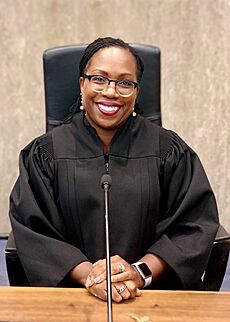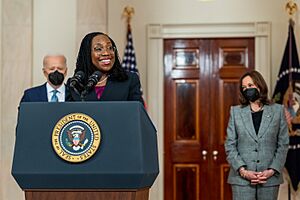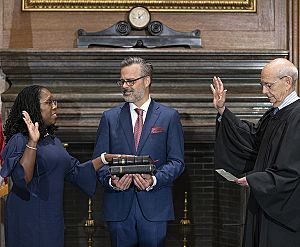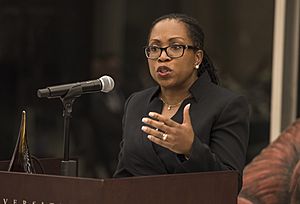Ketanji Brown Jackson facts for kids
Quick facts for kids
Ketanji Brown Jackson
|
|
|---|---|
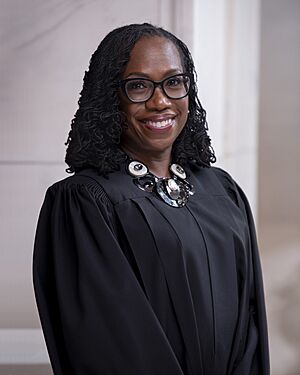
Official portrait, 2024
|
|
| Associate Justice of the Supreme Court of the United States | |
| Assumed office June 30, 2022 |
|
| Nominated by | Joe Biden |
| Preceded by | Stephen Breyer |
| Judge of the United States Court of Appeals for the District of Columbia Circuit | |
| In office June 17, 2021 – June 29, 2022 |
|
| Nominated by | Joe Biden |
| Preceded by | Merrick Garland |
| Succeeded by | Florence Y. Pan |
| Judge of the United States District Court for the District of Columbia | |
| In office March 26, 2013 – June 17, 2021 |
|
| Nominated by | Barack Obama |
| Preceded by | Henry H. Kennedy Jr. |
| Succeeded by | Florence Y. Pan |
| Vice Chair of the United States Sentencing Commission | |
| In office February 12, 2010 – December 2014 |
|
| President | Barack Obama |
| Preceded by | Rubén Castillo |
| Succeeded by | L. Felipe Restrepo |
| Personal details | |
| Born |
Ketanji Onyika Brown
September 14, 1970 Washington, D.C., U.S. |
| Spouse |
Patrick Jackson
(m. 1996) |
| Children | 2 |
| Relatives | Calvin Ross (uncle) |
| Education | Harvard University (BA, JD) |
| Signature | |
Ketanji Onyika Brown Jackson (born September 14, 1970) is an American lawyer and judge serving as an associate justice of the Supreme Court of the United States. President Joe Biden nominated her to the Supreme Court in 2022.
She is the first Black woman to serve on the Supreme Court. She is also the first former federal public defender and the sixth woman to hold this position.
Jackson was born in Washington, D.C., and grew up in Miami, Florida. She studied at Harvard University for both her undergraduate and law degrees. Early in her career, she worked as a law clerk for Justice Stephen Breyer, the same justice she would later replace on the Supreme Court.
Before joining the Supreme Court, Jackson held several important roles. She was a judge on lower federal courts and served as the vice chair of the United States Sentencing Commission. On the Supreme Court, she is considered part of the liberal group of justices, along with Justices Elena Kagan and Sonia Sotomayor.
Contents
Early Life and Education
Ketanji Brown Jackson was born on September 14, 1970, in Washington, D.C.. Her parents, Johnny and Ellery Brown, were both teachers who attended historically black colleges and universities. Her father later became the main lawyer for the Miami-Dade County School Board. Her mother was the principal at the New World School of the Arts in Miami.
Jackson grew up in Miami and went to Miami Palmetto Senior High School. She was a star debater and won a national public speaking competition. In her high school yearbook, she said she wanted to study law and become a judge one day.
After high school, Jackson attended Harvard University. A guidance counselor had told her to aim for a less competitive school, but she applied to Harvard anyway. At college, she studied government and was part of the Black Students Association. She graduated with high honors in 1992.
She then worked for Time magazine before going to Harvard Law School. She was an editor of the Harvard Law Review, a very respected student-run journal. She graduated with her law degree in 1996.
Early Career as a Lawyer
After law school, Jackson began her legal career. She worked as a law clerk for two federal judges. A law clerk is a lawyer who helps a judge with research and writing. From 1999 to 2000, she clerked for Supreme Court Justice Stephen Breyer.
Jackson also worked in private law firms. From 2005 to 2007, she was an assistant federal public defender in Washington, D.C. Public defenders represent people who cannot afford a lawyer. During this time, she won important cases that helped reduce or remove long prison sentences for her clients.
U.S. Sentencing Commission
In 2009, President Barack Obama nominated Jackson to be the vice chair of the United States Sentencing Commission. This group sets rules for how long people should be sentenced for federal crimes. The Senate confirmed her in 2010.
During her time on the commission, she helped change sentencing rules. These changes led to shorter sentences for some types of crimes. She served on the commission until 2014.
Judge on Lower Federal Courts
U.S. District Court (2013–2021)
In 2012, President Obama nominated Jackson to be a judge for the United States District Court for the District of Columbia. She was confirmed by the Senate in 2013.
As a district judge, she made several important rulings. In one famous case, she wrote that "presidents are not kings" when she ordered a former White House official to testify before Congress. She also made decisions in cases about government agencies and workers' rights.
U.S. Court of Appeals (2021–2022)

In 2021, President Joe Biden promoted Jackson to the United States Court of Appeals for the District of Columbia Circuit. This court is often called the second most important court in the country.
She served on this court for about a year. During that time, she wrote two majority opinions. One opinion was about the rights of government workers' unions to negotiate with the government.
Supreme Court Nomination and Career
How She Joined the Supreme Court
In early 2022, Justice Stephen Breyer announced he would retire. This created a vacancy on the Supreme Court. During his presidential campaign, Joe Biden had promised to nominate a Black woman to the court if a spot opened up.
On February 25, 2022, President Biden officially nominated Jackson. Her nomination was supported by many civil rights groups. After hearings, the Senate voted to confirm her on April 7, 2022. Three Republican senators joined all 50 Democrats in voting for her.
Jackson was sworn in on June 30, 2022. She became the 116th justice of the Supreme Court.
Her Work on the Supreme Court
Since joining the court, Justice Jackson has been an active participant in oral arguments. These are the public sessions where lawyers present their cases to the justices. She often asks many questions.
In February 2023, she wrote her first majority opinion for the court in a case called Delaware v. Pennsylvania. The case was about how to distribute unclaimed money from financial services.
Jackson has also written important dissenting opinions. A dissent is written when a justice disagrees with the majority's decision. For example, she dissented in a case about labor unions, arguing that the court's decision could weaken the right of workers to strike.
In 2023, she dissented in a major case that limited the use of affirmative action in college admissions. She wrote that race has always been a factor in American history and that ignoring it could harm progress toward equality.
Personal Life
In 1996, Jackson married Dr. Patrick Jackson, a surgeon. They met when they were both students at Harvard. They have two daughters. Jackson is a non-denominational Protestant.
Through her marriage, Jackson is related to Paul Ryan, a former Speaker of the United States House of Representatives.
Jackson has said that her ancestors were likely slaves. Her family history traces back to Georgia.
In December 2024, she made a special appearance in the Broadway musical & Juliet. She played herself in a short scene written just for her. She called it a "lifelong dream."
Images for kids
See also
 In Spanish: Ketanji Brown Jackson para niños
In Spanish: Ketanji Brown Jackson para niños
- Barack Obama Supreme Court candidates
- Demographics of the Supreme Court of the United States
- Joe Biden judicial appointment controversies
- Joe Biden Supreme Court candidates
- List of African American federal judges
- List of African American jurists
- List of justices of the Supreme Court of the United States
- List of law clerks of the Supreme Court of the United States (Seat 2)
- List of United States Supreme Court justices by time in office
Additional sources
- "Tracking the Progress of African Americans on the Editorial Rolls of America's Most Prestigious Law Journal". The Journal of Blacks in Higher Education (47): 44–46. Spring 2005. doi:10.2307/25073170.
 | May Edward Chinn |
 | Rebecca Cole |
 | Alexa Canady |
 | Dorothy Lavinia Brown |


